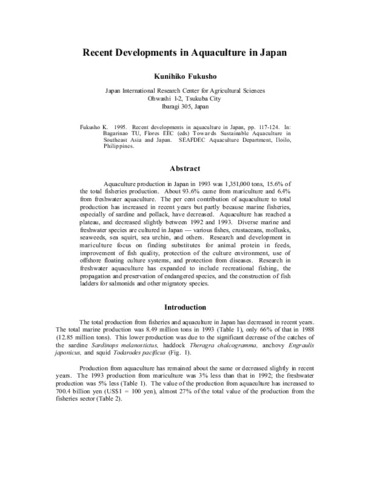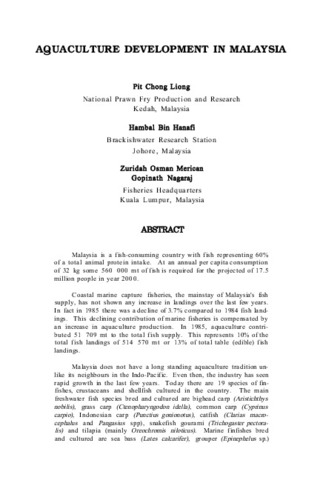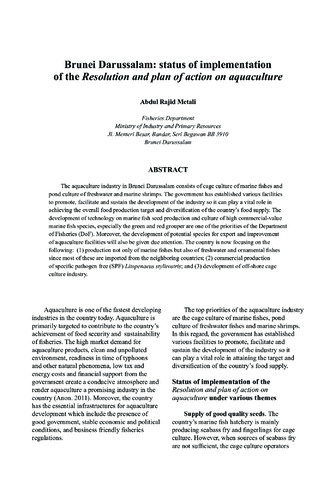| dc.contributor.author | Adora, Gil A. | |
| dc.contributor.editor | Acosta, Belen O. | |
| dc.contributor.editor | Coloso, Relicardo M. | |
| dc.contributor.editor | de Jesus-Ayson, Evelyn Grace T. | |
| dc.contributor.editor | Toledo, Joebert D. | |
| dc.date.accessioned | 2013-12-06T02:23:43Z | |
| dc.date.available | 2013-12-06T02:23:43Z | |
| dc.date.issued | 2011 | |
| dc.identifier.citation | Adora, G. A. (2011). Philippines: Status of implementation of the resolution and plan of action on aquaculture. In B. O. Acosta, R. M. Coloso, E. G. T. de Jesus-Ayson, & J. D. Toledo (Eds.), Sustainable aquaculture development for food security in Southeast Asia towards 2020. Proceedings of the Regional Technical Consultation on Sustainable Aquaculture Development in Southeast Asia Towards 2020 (pp. 105-111). Tigbauan, Iloilo, Philippines: SEAFDEC Aquaculture Department. | en |
| dc.identifier.isbn | 9789718511992 | |
| dc.identifier.uri | http://hdl.handle.net/10862/1828 | |
| dc.description.abstract | The aquaculture sector in the Philippines has remarkably grown in the last decade. It is now a prominent sector contributing significantly to the country s overall fisheries production. In 2008, aquaculture posted the highest production growth at 48.5% (2.4 million mt), followed by the municipal fisheries sector with 26.8% (1.3 million mt), and the commercial fisheries sector with 24.7% increase (1.2 million mt). Sustainable management of the sector is a primary concern because the Bureau of Fisheries and Aquatic Resources (BFAR) recognizes that this tremendous growth in aquaculture production must be balanced with ecological considerations.
This report outlines the major steps BFAR, as the agency mandated to protect aquatic resources and practice sustainable aquaculture in the Philippines, has taken towards the achievement of the objectives/themes outlined in a plan of action for aquaculture set during the 2001 ASEAN-SEAFDEC Fisheries millennium conference in Bangkok, Thailand.
The country has gained significant strides in promoting environment-friendly aquaculture, especially with the promotion of the mariculture park projects. In line with this theme, policies to promote sustainable aquaculture and strategies to ensure healthy and wholesome aquaculture were formulated. Research, development and extension activities are in progress towards ensuring sustainable aquaculture and achieving the other commitments, as outlined in the Resolution and plan of action for the aquaculture sector in the Philippines which was proposed during the 2001 Bangkok conference of senior officials of ASEAN member countries. | en |
| dc.language.iso | en | en |
| dc.publisher | Aquaculture Department, Southeast Asian Fisheries Development Center | en |
| dc.subject | Philippines | en |
| dc.title | Philippines: Status of implementation of the resolution and plan of action on aquaculture. | en |
| dc.type | Conference paper | en |
| dc.citation.spage | 105 | |
| dc.citation.epage | 111 | |
| dc.subject.asfa | aquaculture | en |
| dc.subject.asfa | aquaculture development | en |
| dc.subject.asfa | aquaculture economics | en |
| dc.subject.asfa | breeding | en |
| dc.subject.asfa | culture effects | en |
| dc.subject.asfa | feeds | en |
| dc.subject.asfa | fish culture | en |
| dc.subject.asfa | fish diseases | en |
| dc.subject.asfa | Fish meal | en |
| dc.subject.asfa | food security | en |
| dc.subject.asfa | national planning | en |
| dc.subject.asfa | seed (aquaculture) | en |
| dc.subject.asfa | sustainability | en |
| dc.subject.asfa | Marine aquaculture | en |
| dc.citation.conferenceTitle | Sustainable aquaculture development for food security in Southeast Asia towards 2020. Proceedings of the Regional Technical Consultation on Sustainable Aquaculture Development in Southeast Asia Towards 2020 | en |



